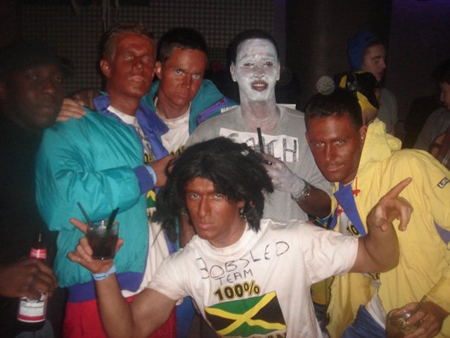"Deep in our history of struggle for freedom Canada was the North Star."
-- Martin Luther King, Jr., CBC Massey Lectures, 1967
It is disturbing to see the tradition of blackface, which I, for one, was hoping had died off, make an alarming comeback. Even more disturbing is that the revival is taking place in Canada, a nation seen by many as the beacon of freedom for U.S. slaves.
Five University of Toronto students came under fire earlier this year for dressing up as the Hollywood version of the Jamaican bobsled team from the film Cool Runnings for a university-hosted Halloween party. The students went to the party in blackface, and won the award for best costume. When later confronted about their costume choice, the students claimed that it was all in good fun: "Throughout our childhood, Cool Runnings was something we reflected on with fond memories."

Five students dressed as members of the Jamaican bobsled team received costume award - photo uploaded from Torontoist.com
For many living in Canada and America, blackface is not something we reflect fondly upon. Whether we're talking about Cool Runnings or haute couture, Tyra Banks or even video games, these modern forms of minstrelsy are blatantly racist.
As University of Toronto Professor Rinaldo Walcott, who wrote Black Like Who? (1997), explains,
"For black people who understand [blackface]... Cool Runnings was never a funny film [...]. We know that in North America there is a deep resonance around producing images of black people that make black people look disgusting. Cool Runnings is a milder version of that. So we should ask... why do they remember Cool Runnings so fondly?"
White people painting themselves "Black" for entertainment or shock value actively erases its minstrel roots. Canada's racist history has been buried by making blackface revivals possible.
The racist legacy in Canada is not old news, and discourses of equality and multiculturalism continue to hide the nation's history of enslavement - an act that makes blackface seem acceptable as an aesthetic or social experiment.
People think of Canada as the land where slaves fled oppression, enough so that even MLK saw it as a nation founded upon freedom. Contrary to popular belief, the nation was largely built on the institution of slavery. In 1628, Olivier Le Jeune became the first recorded slave sold in Canada. Canada granted a special license to American loyalists, exempting taxes on the slaves brought in. A number of U.S. States (Delaware, Michigan, Rhode Island, and Connecticut) banned slavery before Canada did.
While North American legacies of black-to-white racial passing were once tinged with the question of survival, the blackface tradition is plainly exploitative. Blackface is an investment in the authenticity of whites, and the disposability of Blacks, most often masked in arguments that race is a fluid construct - arguments which have further thrown slavery and blackface outside the lexicon of Canadian history.
Though the University of Toronto students apologized, it was clear that they did not fully understand why their actions were offensive, which heightened the sting. Moreover, the University's administration has yet to provide a formal public apology, sending the message that it does not value the concerns of Black students. In response, concerned students and community members have created a petition to condemn the university's actions and inappropriate response.
To study the country's true legacy in relation to race, we have to listen for silences and look for gaps... and then speak up. We can start by foiling the University of Toronto's attempt to bury this incident with the age-old tactic of waiting out its critics.
Cross-posted from Race-Talk.
